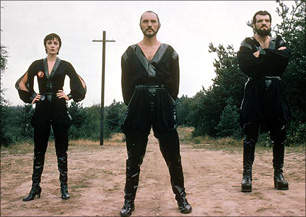Chapter Two: Superman II
By Brett Ballard-Beach
January 3, 2013
In 2001, the band Wilco was dropped by their record label - Reprise, a subsidiary of Warner Music - after playing their completed album Yankee Hotel Foxtrot for a new, less Wilco-friendly regime that had replaced some of the band’s biggest supporters at the label, in the wake of the then-recent merger of Time Warner and AOL. In a rare (and inexplicable) move of beneficence from corporate America, Reprise gave the band the masters for the album for $50,000 and released them from their contract. Jeff Tweedy decided to stream the album on the band’s website, drawing a rush of fans and much critical acclaim. Several dozen labels became interested in releasing the album in a physical format and the band settled on Nonesuch Records, a subsidiary of Time Warner AOL. Yes, this can be taken as a comment on the creation of large supercompanies over the last three decades, but I prefer to think of it as “the man,” in some small way, getting the shaft. As for the connection that I see between all three examples? Corporate America giveth. Corporate America taketh away. And if there’s any way to salvage an investment, whether by throwing bad money after good, good money after bad, or reversing your position down the line, CA will step up to the plate.
The Superman series strikes me as the most egregious example of a film series that ran itself into the ground quite rapidly after a highly acclaimed and financially lucrative beginning. I have never been the biggest fan of the character in comic book or big-screen format. I have seen Superman: The Movie a sum total of (I think) three times now, the most recent a few days ago in its 151-minute director’s cut. Superman II is one I recall watching multiple times on cable as a six year old, but the only thing that stuck with me was the sight of powerless Superman/Clark Kent getting bloodied up by a bully in a greasy spoon diner. Superman III was viewed once, most likely in the theaters. I recall Richard Pryor on skis and a campy demise for villain Robert Vaughn. Superman IV: The Quest for Peace remains unseen to this point. However, a Warner Bros four-pack of the series is in my possession and I do plan on catching up with the latter two in the coming weeks.
Although I don’t know if I would deem it “telling,” it strikes me as highly symbolic - and more than a little amusing - that the only time Christopher Reeve got sole above the title billing was for Superman IV. For the first Superman, heavyweights Marlon Brando and Gene Hackman received top status. For Superman II, it was Hackman and Reeve. And for Superman III, Reeve finally came first and shared top billing with… Richard Pryor. More on the incongruity of that in a moment.
1978’s Superman is a film so full of good cheer, so devoid of cynicism, so earnest in its desire to be respectful to Superman’s origins and to rise above being thought of as a “comic book movie” that it almost suffocates in the early going on its grand notions. (However, given the natures of the catastrophes that bookend the film, it occurred to me that Superman could be considered, in one respect, as the only highbrow disaster movie of the 1970s.) Brando is there for the first 10 minutes, and in brief bits over the rest of the film, as if to assure audiences that this is 100% high class. (Other actors, like Hackman, Jackie Cooper and Glenn Ford serve a similar purpose. Hell, author of The Godfather Mario Puzo wrote the screen story and contributed to the screenplay! ) The origin story that occupies the first 50 minutes - or one-third of the running time - may have been thought necessary, but it simply delays the arrival of the film and the series’ greatest strength: Reeve.
Continued:
1
2
3
4
5
|
|
|
|




